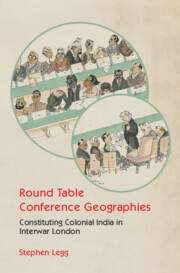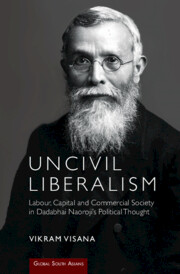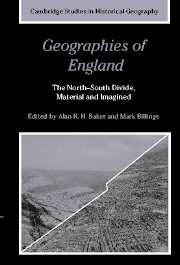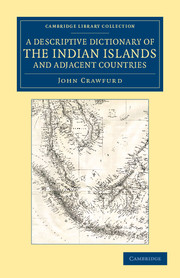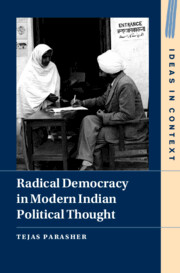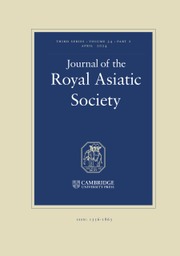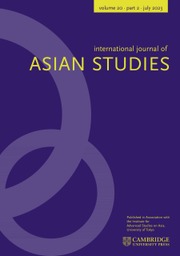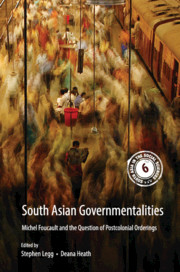Round Table Conference Geographies
Constituting Colonial India in Interwar London
$120.00 ( ) USD
- Author: Stephen Legg, University of Nottingham
- Date Published: March 2023
- availability: This ISBN is for an eBook version which is distributed on our behalf by a third party.
- format: Adobe eBook Reader
- isbn: 9781009276719
Find out more about Cambridge eBooks
$
120.00 USD
( )
Adobe eBook Reader
Other available formats:
Hardback
Looking for an examination copy?
If you are interested in the title for your course we can consider offering an examination copy. To register your interest please contact [email protected] providing details of the course you are teaching.
-
Round Table Conference Geographies explores a major international conference in 1930s London which determined India's constitutional future in the British Empire. Pre-dating the decolonising conferences of the 1950s–60s, the Round Table Conference laid the blueprint for India's future federal constitution. Despite this the conference is unanimously read as a failure, for not having comprehensively reconciled the competing demands of liberal and Indian National Congress politicians, of Hindus and Muslims, and of British versus Princely India. This book argues that the conference's three sessions were vital sites of Indian and imperial politics that demand serious attention. It explores the spatial politics of the conference in terms of its imaginary geographies, infrastructures, host city, and how the conference was contested and represented. The book concludes by asking who gained through representing the conference as a failure and explores it, instead, as a teeming political, social and material space.
Read more- Crafts a trans-disciplinary methodology for exploring interwar internationalism and imperialism
- Helps readers appreciate the complex interplay between official work and unofficial reportage in crafting public perceptions of political events
- Shows how complex political events play out through formal and informal practices and places
Reviews & endorsements
‘To think about the geographies of the Round Table Conference is to appreciate that what occurred ‘behind the scenes’ was absolutely consequential to 20th century global imperial history. Legg shows how critical a variety of infrastructures - from palaces, flats and tearooms to gavels, coat racks and washstands - were to both official and subaltern diplomacy during this watershed interwar event. If London was the great unacknowledged delegate to the conference, its most public and most intimate spaces are key to understanding the role of cultural relations in the history of India’s pathway to full political sovereignty. Thanks to Legg’s amazing footwork, we have a whole new understanding of all the rooms where it happened.’ Antoinette Burton, University of Illinois Urbana-Champaign
See more reviews‘Legg radically reimagines the Round Table Conference (RTC), often relegated to a stodgier sideshow of state-making and nationalism on the ground, by focusing on the politics of representation, labour, infrastructure and space that went into making the RTC. In doing so, he shows how Indian delegates at the RTC innovated new spaces of internationalist politics and challenged Western stereotypes of backwardness. Elegantly crafted, and engagingly written, Legg offers us rich theoretical tools and incisive methods to understand the production of internationalism in the 20th century.’ Rohit De, Yale University
‘This compelling, beautifully written and detailed account of the Round Table Conference brings together geographies of colonialism and diplomacy to exemplify how colonial democracy was practised. Stephen Legg brings to attention a largely overlooked conference and the deliberations that occurred and extended beyond the meeting venue itself, providing captivating insights into how representation, communication and decision-making unfolded. The book includes evocative details of how the Indian delegates negotiated the simultaneously racist and hospitable landscape of 1930s London and draws on archival material to illuminate their experiences of being lavishly entertained at tea parties, receptions and soirees. Legg offers a distinctly geographical exploration of a unique historical event that highlights how liberalism and imperialism were being played out in the interwar period. In bringing together geo-political debates with the intricacies of practices and encounters, this book both delights and challenges the reader.’ Uma Kothari, University of Manchester
‘Legg helps us understand the contentious relationship between empire and democratisation through an underappreciated forum - the conference. With forensic and careful argumentation, Legg provides an intimate political geography of power and representation.’ Robbie Shilliam, Johns Hopkins University
‘Stephen Legg’s scholarship was already beyond compare. With Round Table Conference Geographies, Legg has cemented his position as a historian whose works must be read in order to understand late colonial India. In particular, for anyone working on Indian constitutional histories, Legg’s book is a must-read. In the beginning of the book, Legg mentions three doyens of this field whose works remained close to him, R. J. Moore, Carl Bridge, and Ian Copland. (13). Undoubtedly, Stephen Legg has to be the fourth name added by any future scholar working in this field.’ Arvind Elangovan, The London Journal
Customer reviews
Not yet reviewed
Be the first to review
Review was not posted due to profanity
×Product details
- Date Published: March 2023
- format: Adobe eBook Reader
- isbn: 9781009276719
- availability: This ISBN is for an eBook version which is distributed on our behalf by a third party.
Table of Contents
List of Figures and Tables
Acknowledgements
Note on Conclusions, Spellings and Abbreviations
1. Introduction: Squaring Round Tables
Part I. Geographical Imaginations:
2. Dominion and Dyarchy: The Absent Presences
3. Community: A Nation and a Table Divided
Part II. Conference Infrastructures:
4. The Conference Method: Between Intention and Desire
5. Staffing the Conference: Experts and Subaltern Diplomats
6. The Speech Factory: Palace Materials and Communication Technologies
Part III. The Conference City:
7. A Hospitable City?: Official Socialising
8. Social London: Residing and Dining
9. At Homes: Political Hostessing and Homemaking
Part IV. Representations:
10. Petitions and Protests: The Page and the Street
11. Failure: Ending and Failing
12. Conclusion: Squaring Round Tables
Notes
References
Index.
Sorry, this resource is locked
Please register or sign in to request access. If you are having problems accessing these resources please email [email protected]
Register Sign in» Proceed
You are now leaving the Cambridge University Press website. Your eBook purchase and download will be completed by our partner www.ebooks.com. Please see the permission section of the www.ebooks.com catalogue page for details of the print & copy limits on our eBooks.
Continue ×Are you sure you want to delete your account?
This cannot be undone.
Thank you for your feedback which will help us improve our service.
If you requested a response, we will make sure to get back to you shortly.
×
